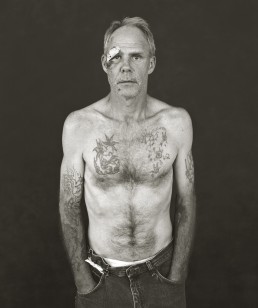S3: Fine Line - Episode 17 - Jerry

Episode Information
Fine Line: Mental Health/Mental Illness – Episode 17 – Jerry
[Intro Music]
Narrator: Welcome to Season three Fine Line narrative histories about mental health and mental illness, a traveling exhibition and weekly podcast edited and hosted by Michael Nye, supported by Kronkosky Charitable Foundation. May you find insight and understanding in these voices. Episode Seventeen, Jerry.
Jerry: Monday, Monday I was drinking. I went to jail. And then Wednesday I went to jail. And then yesterday I went to jail due to alcohol. And it is just like being in a, in a, a haze, you know, a blackout. But I have to do what I have to do because if I don’t self-medicate myself, then I’m gonna be worse than what I am now. I’m either gonna be beat down or I’m going to beat someone else down. It’s like a Dr. Jekyll, Mr. Hyde thing. That’s the insanity. My parents sent me to a mental hospital when I was six. I didn’t like it there. It was the worst, probably the worst experience I’ve had. I was there almost two years. My brothers and sisters, they knew that I had a, a dysfunction or whatever, and, and they called me recard. But then after a while though, I got to believe in him.
Well, you know, maybe I’m retarded, you know, in, in my own head. I remember I used to sit there, there was a hallway. I used to sit there and watch my dad walk down when he’d come to get me on weekends. It’s like, you know, when’s it gonna end? When are they gonna let me out? My dad was from Missouri, and he, and he, it was from a hardworking family. He embedded into my brothers and me that men don’t cry. That was a defect. You know, he believed in, you go to work, you take care of your business, and you, you, you bring a family up the right way. You know, there was no, no border in between. You either done what you’re supposed to do, or you suffered the consequences when he drank. That’s just in, I guess, intensifies his beliefs a little more than what they should have.
When I became homeless was, I was 16, a guy named Joe. He told me, he says, you know what? You keep coming around, I’ll, I’ll school you. And that’s probably the best, best education I ever had in my whole life. Even though he was a tramp, and he was a whio, someone that took the time to say, Hey, if you don’t listen to what I gotta say, you’re not gonna survive. You know? And then subsequently, five or six years later, I went to the penitentiary and I come out and he was no longer around. I, I’m diagnosed with bipolar, mood swings, depression, turmoil, anxiety, hate, wanting lash out. Other times, being euphoric happy. My state of depression is that somebody could walk up to you and just say, Hey, have a nice day, and just blow your brains out. You don’t care. As long as it’s fast and painless, you don’t care.
And you know, it is, it’s sometimes you walk, I walk around sometimes and I’ll be so depressed, and it’s like, people can see it, you know, they could see your face to where your face is distorted or whatever. The anger that you have. I wish I could put my brain on the table there, and you could open it up and you could see what’s in it. People need to be more educated about bipolar or depression or whatever. You know, they had a thing the other day about the county jail. There’s 70% in there that are, that are, have some kind of mental disorder. But what do they do? They either push you somewhere where society’s not gonna see you, or they lock you up. I, I walk up and down these streets every day, you know, I walk, I constantly walk, constantly walk. And a lot of people won’t talk to street people because they look at street people.
They’re either grubby or they’re nasty, or, but they think they’re trash. They’re not trash. They’re human beings sometimes getting beat down, you know, that makes you feel good because it makes you feel like I’m wanted, at least somebody took the effort to take this time and whoop me. You know? It’s like, <laugh>. I serious. It sounds crazy, but it’s true. You know, I mean, there’s nothing wrong with that. You know? I, I just want to fit in. I wanna be a normal person. And I don’t think that there is too many people out there in society that want to end up like me or live like me. It’s a dangerous life. It’s not fun.
[Outro Music]
Host: Jerry’s narrative is sobering, disturbing in ways that mental health treatment was not available for him. I found out that Jerry died on the streets four months after we talked. John Rawls philosopher has written much about the notion of justice. He says, justice is the first virtue of a social institution, as truth is of systems of thought. Simply put Rawls rights. Justice is about fairness. It’s unfair, it’s unjust that over 65% of those incarcerated or homeless or poor struggle with mental illness and treatment is unavailable or inadequate. There are efforts and groups around the country working to improve this tragic reality. Justice starts not only with listening, but with remembering. Jerry’s voice is important and valuable. Thank you, Jerry, for your wisdom and your presence. Every person, every place, is a map to somewhere else. I’m Michael Nye. You can go to my website, michaelnye.org/podcast for Jerry’s portrait and transcript. Thank you for listening.
